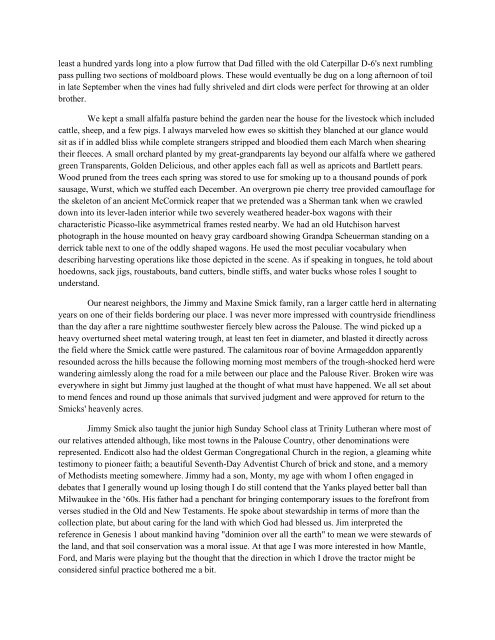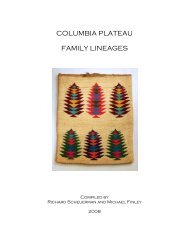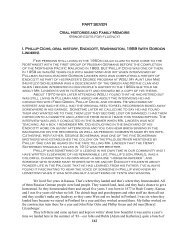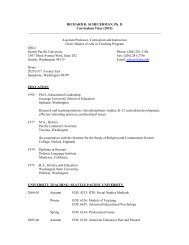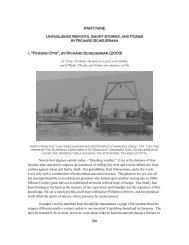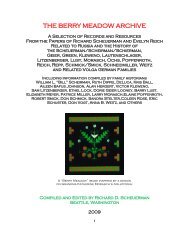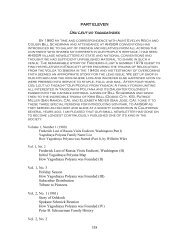A Heritage of Hills - Mountain Light School
A Heritage of Hills - Mountain Light School
A Heritage of Hills - Mountain Light School
You also want an ePaper? Increase the reach of your titles
YUMPU automatically turns print PDFs into web optimized ePapers that Google loves.
least a hundred yards long into a plow furrow that Dad filled with the old Caterpillar D-6's next rumbling<br />
pass pulling two sections <strong>of</strong> moldboard plows. These would eventually be dug on a long afternoon <strong>of</strong> toil<br />
in late September when the vines had fully shriveled and dirt clods were perfect for throwing at an older<br />
brother.<br />
We kept a small alfalfa pasture behind the garden near the house for the livestock which included<br />
cattle, sheep, and a few pigs. I always marveled how ewes so skittish they blanched at our glance would<br />
sit as if in addled bliss while complete strangers stripped and bloodied them each March when shearing<br />
their fleeces. A small orchard planted by my great-grandparents lay beyond our alfalfa where we gathered<br />
green Transparents, Golden Delicious, and other apples each fall as well as apricots and Bartlett pears.<br />
Wood pruned from the trees each spring was stored to use for smoking up to a thousand pounds <strong>of</strong> pork<br />
sausage, Wurst, which we stuffed each December. An overgrown pie cherry tree provided camouflage for<br />
the skeleton <strong>of</strong> an ancient McCormick reaper that we pretended was a Sherman tank when we crawled<br />
down into its lever-laden interior while two severely weathered header-box wagons with their<br />
characteristic Picasso-like asymmetrical frames rested nearby. We had an old Hutchison harvest<br />
photograph in the house mounted on heavy gray cardboard showing Grandpa Scheuerman standing on a<br />
derrick table next to one <strong>of</strong> the oddly shaped wagons. He used the most peculiar vocabulary when<br />
describing harvesting operations like those depicted in the scene. As if speaking in tongues, he told about<br />
hoedowns, sack jigs, roustabouts, band cutters, bindle stiffs, and water bucks whose roles I sought to<br />
understand.<br />
Our nearest neighbors, the Jimmy and Maxine Smick family, ran a larger cattle herd in alternating<br />
years on one <strong>of</strong> their fields bordering our place. I was never more impressed with countryside friendliness<br />
than the day after a rare nighttime southwester fiercely blew across the Palouse. The wind picked up a<br />
heavy overturned sheet metal watering trough, at least ten feet in diameter, and blasted it directly across<br />
the field where the Smick cattle were pastured. The calamitous roar <strong>of</strong> bovine Armageddon apparently<br />
resounded across the hills because the following morning most members <strong>of</strong> the trough-shocked herd were<br />
wandering aimlessly along the road for a mile between our place and the Palouse River. Broken wire was<br />
everywhere in sight but Jimmy just laughed at the thought <strong>of</strong> what must have happened. We all set about<br />
to mend fences and round up those animals that survived judgment and were approved for return to the<br />
Smicks' heavenly acres.<br />
Jimmy Smick also taught the junior high Sunday <strong>School</strong> class at Trinity Lutheran where most <strong>of</strong><br />
our relatives attended although, like most towns in the Palouse Country, other denominations were<br />
represented. Endicott also had the oldest German Congregational Church in the region, a gleaming white<br />
testimony to pioneer faith; a beautiful Seventh-Day Adventist Church <strong>of</strong> brick and stone, and a memory<br />
<strong>of</strong> Methodists meeting somewhere. Jimmy had a son, Monty, my age with whom I <strong>of</strong>ten engaged in<br />
debates that I generally wound up losing though I do still contend that the Yanks played better ball than<br />
Milwaukee in the „60s. His father had a penchant for bringing contemporary issues to the forefront from<br />
verses studied in the Old and New Testaments. He spoke about stewardship in terms <strong>of</strong> more than the<br />
collection plate, but about caring for the land with which God had blessed us. Jim interpreted the<br />
reference in Genesis 1 about mankind having "dominion over all the earth" to mean we were stewards <strong>of</strong><br />
the land, and that soil conservation was a moral issue. At that age I was more interested in how Mantle,<br />
Ford, and Maris were playing but the thought that the direction in which I drove the tractor might be<br />
considered sinful practice bothered me a bit.


